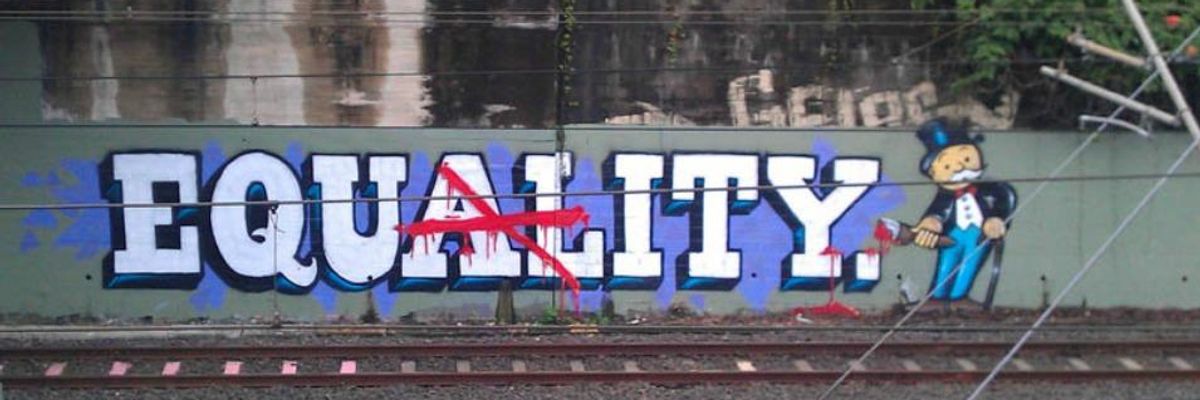The Commerce Department released some revised figures on America's economy last week. Previous numbers, Commerce researchers noted, had overestimated the share of the nation's income going to workers and underestimated the share going to America's asset-rich.
"Everything's coming up roses for people who own a chunk of American capital," observed Brookings Institution economist Gary Burtless after the new stats emerged. "What we've seen in the economic recovery is inequality on steroids. The market is giving wealthy people a very good run."
That "very good run" has actually been lasting a very long time. Since 1982, the income share of America's top 1 percent has more than doubled, from 10.8 percent in 1982 to 22.5 percent in 2012.
Americans down below those top 1 percent heights, meanwhile, haven't been on much of a run at all. They've been falling. The wealth of the typical American household has dropped nearly 20 percent since 1984, says a new Russell Sage Foundation study.
As of June 2014, adds a new analysis of private sector wages, average American worker real wages have dipped 16.2 percent since 1972, their record high point.
Fabulously good times for the ultra affluent. Struggling times for most everybody else. This bifurcated reality has essentially become America's "new normal."
Good times for the affluent. Struggles for most everybody else. America's 'new normal.'
How long can this "new normal" last? Can the "old normal" -- those years right after World War II that saw a much more equal America -- make a comeback? And if this "new normal" does continue, what's going to happen to us?
Questions like these are finally gaining some serious air-time. Credit economist Thomas Piketty in part. His Capital in the Twenty-First Century bestseller has shoved wealth's concentration into our political discourse. Current trends, he details compellingly, have us well on the way to recreating levels of top-heavy wealth distribution not seen since the eve of the French Revolution.
Other economists are digging even deeper into the future. One of them, Lars Osberg from Canada's Dalhousie University, has just had some thoughtful -- and deeply disturbing -- reflections published by the OECD, the international economic research agency for the world's developed nations.
Osberg's provocative new OECD working paper dives into decades of data from the United States, Canada, and Australia and explores whether our "new normal" might run out of steam on its own -- and what will happen if it doesn't.
Osberg has prepared this OECD paper for his fellow economists, and his discussion at times can get too technical for general readers. But the paper's dramatic takeaways, even so, stand out clearly.
The first: Our world's deeply unequal market economies have no automatic "self-correcting" mechanism.
Our deeply unequal market economies have no automatic self-correct.
Osberg invites us to consider, for instance, the situation with soaring corporate executive compensation. The conventional explanation for this executive excess posits that top CEOs are making so much more these days because generous incentives have them working harder.
Now if top CEOs are indeed making so much more because they're working harder, notes Osberg, then "at some point" executive pay would self-correct and stop escalating so much faster than worker pay.
"After all," as his OECD paper points out, "individual 'effort' -- both hours of work and work intensity per hour -- cannot increase without limit."
But in the real world, Osberg observes, executive paychecks aren't increasing because today's execs are working harder than their counterparts a generation ago. Rising CEO pay reflects instead the grander scale of today's global markets -- and the capacity of top execs to exploit their hierarchical rank.
Those global markets will be expanding for decades to come, Osberg's paper shows, in everywhere from China to sub-Saharan Africa. And for the execs who direct that expansion, compensation remains "the marker that indicates who is 'winning' or 'losing' in the race for success."
Few CEOs want to lose that race. This combination of market and organizational dynamics will keep shoving CEO rewards ever higher. No self-correction here.
Market and organizational dynamics will keep shoving CEO rewards ever higher.
A second major takeaway from Osberg's new OECD working paper: An unbalanced economy -- an economy where rewards at the top are multiplying much more rapidly than rewards below -- generates ever-growing social pressures for still more imbalance.
Consider, for instance, the interplay between great wealth and social mobility. For wealthy elites, Osberg reminds us, real mobility constitutes a threat. They can only move down -- and the greater the gap between the wealthy and most other people, the greater the "drop from the top" -- and "the more important it becomes for rich parents to give their own children every possible advantage."
"Increasing inequality," Osberg goes on, "thus accentuates the reluctance of the elite to pay the taxes that can partially equalize opportunity by funding public expenditure on the human capital of all children -- because their own children have the most to lose from such spending."
The third key takeaway from Osberg's new OECD paper: Unequal economies can't "self-correct." But people within those economies can correct them.
How can Osberg be so sure? He points, for starters, to today's "diversity of inequality levels" among developed nations. Different societies have made different social and political decisions. These decisions have produced significantly different levels of income inequality, and that "in turn implies that choices can be made about future inequality levels."
Those choices -- more progressive income and wealth taxation, more robust investments in public goods, and the like -- will be difficult in a globalized world of offshore banking and highly mobile capital. Real progress on any of these fronts will require serious international cooperation.
We can either forge that cooperation, Osberg suggests, or live the greater economic, social, and political instability that growing inequality will inevitably bring. Our "new normal," in effect, could become our new nightmare.

